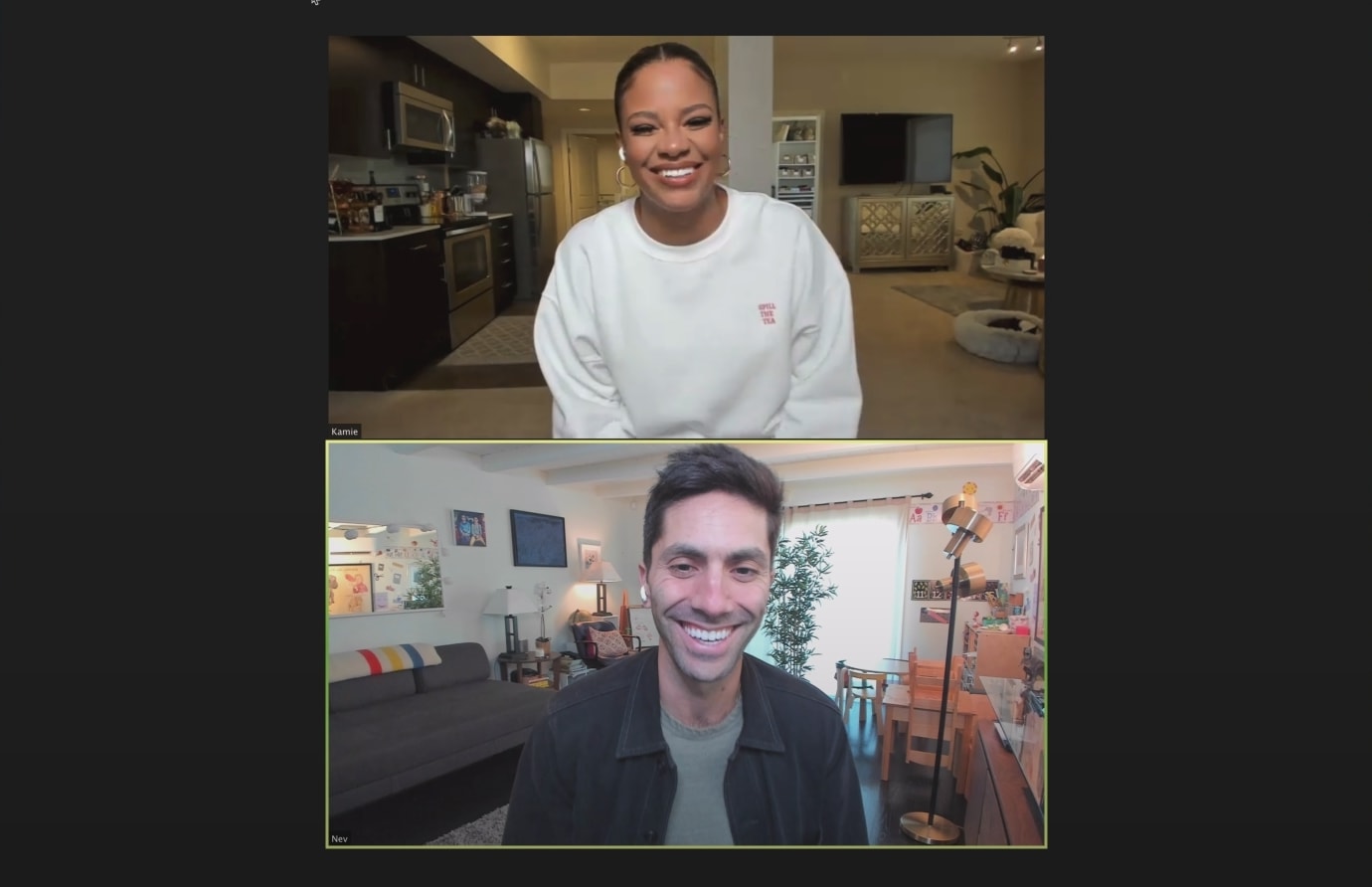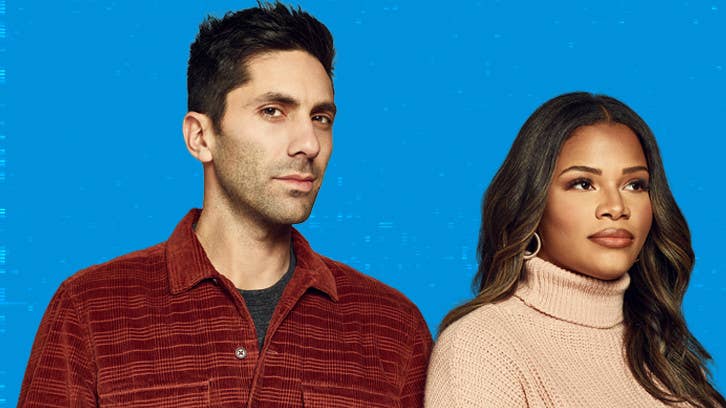
Season 8 of MTV’s Catfish: The TV Show is well underway and hosts Nev Schulman and Kamie Crawford are once again on the quest to help hopeless romantics connect with their longtime online lovers. But if you’ve ever seen the show, you already know that the infatuated will more than likely get their hearts broken somewhere along the way. Hidden identities and fake Facebook pages are not all that stand in the way of bringing people together, in 2020—which marks the 10th anniversary of the original Catfish documentary—there’s a new set of challenges.
The adjustment to a totally digital world is one thing, but pivoting because of a global pandemic adds unprecedented pressure and obstacles for everyone. People’s need for connection only intensifies when their ability to get together ceases to exist. So gathering willing participants for the current season hasn’t been easy, but the tales are just as insane.
Big Brother star, Michael Ellis stars in tonight's episode and he's on a mission to meet his online companion, Julia. As we’ve seen with most before, Julia is hesitant to meet Michael irl, but unlike the usual dramatic endings, Nev says this episode “ends in a really positive, happy way,” which is always the goal even if it’s not always achieved.
Wecaught up with Nev and co-host Kamie to understand the ins and outs of catfishing, why it’s thriving in a pandemic, and the mental effects being catfished can have on one’s psyche.
With everyone on Zoom, FaceTime, Google Chat, and whatever else is out there, how are people still getting catfished during a pandemic?
Nev: For a long time now, video conferencing and video chatting through different platforms has been very available and acceptable. One of the questions I get asked all the time is, How are people still getting catfished? We all live these very public, presentational lives. I think despite the access to the technology needed to avoid getting catfished, there's something very exciting about having something private and meeting someone who feels mysterious. It's very rare that you meet someone these days that is partially or even mostly obscured. And I think people are gravitating towards those types of relationships even more now than ever because in most of the social distractions and activities that we would normally be doing and filling our time with have gone away in many cases.
"I think if a celebrity was talking to you, they would talk to you from their verified account. I don't think you would be talking to them off of a profile that has a professional photo of them with only 40 followers on it." —KAMIE
Do you think people are catfishing more because they’re bored?
Kamie: Right now, we're all living a very shared experience. Everyone is at home. Everyone has idle time, and it's just about what you are doing with [that time]. Between pure anxiety, people who choose to workout or build businesses, or people using this time to catfish. I think people who are already prone to catfishing or haven't done it before are just looking for someone to talk to. People are just looking to make connections and wanting to do it in an easier way because nothing about life right now is easy. Can I really blame them? Not necessarily—because (a) they keep us employed and (b) this is a sh--ty time, so what are you going to do?
Nev: I don't think that's the answer, because I know lots of people that I've met throughout the years who have been catfished that don't necessarily fit the mold of what you'd expect. Some of them are very busy and have full lives, others aren't. I think catfishing is a result of struggle, whether it's emotional or mental, or physical. [Catfishing] is brought on by past experiences, or motivated by need for revenge, or the lack of ability to express oneself.
What do you think goes through someone's mind to make 3,000 “catfishing” profiles like Ashley did during the season premiere? If you're looking for something or you're trying to deal with a struggle, how does creating 3,000 profiles help with that?
Nev: Well, for me, [Ashley] was more just an example of addiction. I don't think that Internet addiction gets talked about enough, but I think it will become something we talk about a lot more going forward. People have more time, and in Ashley's case, whatever circumstances she'd lived [through] her adult life had given her the opportunity to just distract herself over and over again by making these new profiles. I think she's desperate for socialization.
Kamie: I don't even want to begin to try to unpack what goes on in Ashley Taylor's mind, but I will say that just like Nev said, she was very much obsessed with celebrities. All the things that you get by scrolling through The Shade Room for just five minutes; every time you update there's new news, and she was very much into that. She's an interesting character that’s for sure.

How do you see people who were catfished recover from the mental trauma of being duped and it playing out on television?
Kamie: Some people actually take the proper steps, do the right things, and seek out professional help or whatever it may be, and some people are just like, ‘Oh, I've moved on from it. I'm not doing that anymore.’
Nev: It's definitely a case-by-case thing. I know that we provide support to everyone who comes on the show. During the filming of the show, we give them... someone who's licensed that they can talk to on the phone at any time. And then that person is available for them for as long as they need them afterward. We always encourage people to take advantage of that
What do you see when people think they've actually developed a full relationship with a celebrity via social media?
Kamie: Oh, man, that was my second or third episode that I had ever done—as a guest co-host to the show, with the episode with the girl who thought that she was talking to Chris Brown for a few years. Honestly, I think it goes back to access. Not everyone has seen a celebrity in real life, not everyone has seen the amount of people that surround a celebrity in real life.
"[Catfishing] is brought on by past experiences, or motivated by need for revenge, or the lack of ability to express oneself." —NEV
What do you mean?
Kamie: I have gotten so many different emails from people who are like, ‘I think I'm talking to Andy Cohen on Facebook, but he said he has to talk to me on his other Facebook [account] so that his team doesn't see all the messages that we have back and forth.’ They want to know if it's real. I'm just like, ‘I think if a celebrity was talking to you, they would talk to you from their verified account. I don't think you would be talking to them off of a profile that has a professional photo of them with only 40 followers on it.’ For me, and for a lot of people, it seems like a no-brainer, but for some people [dating a celebrity] doesn't feel like it's that far out of their reach.
Nev: I think it goes back to what I was saying earlier about how people feel as though their experience with social media is pretty universal. I think we all have this desire to connect more meaningfully and more privately. And if I'm feeling that, [then] there's no reason that a celebrity couldn't be feeling that. And there's no reason that their hyper public way of life wouldn't drive them to even more of an extreme, to look for a meaningful connection with someone outside of their industry, who's not in their friend group, who isn't publicly involved, so that they can have a genuine human connection. It's an issue of quantity versus quality, and I don't think we're getting the quality that our hearts and minds require.
You mentioned not getting what our hearts and minds require. How do you think younger millennials and Gen Z view romantic relationships?
Nev: I think weirdly, [and] maybe I'm being optimistic and hopeful about it, but I think that there's going to be a swing away from the hookup culture of the past 10 years. Obviously, apps came around, [and] it was very exciting. It made accessing other people for casual encounters incredibly easy. But I get the sense that young people have grown up with access to that, and the novelty of it is not as exciting. What they really want is connection. They want someone that they feel they can talk to, and someone who's available to them, not necessarily 24/7 but at a very high rate because that's what’s lacking most from everybody's life, and certainly young people's life—real friendship.
Kamie: I am the oldest of six sisters, and I've seen the difference between how I was dating when I was their age, and my youngest sisters. They are 14-year-old twins, and the things that they tell me about what goes on the freshman year of high school horrifies me. It's insane. But I think that we don't give millennials and Gen-Zers enough credit because I could not imagine living in their world. I feel for them because I feel they never got the experience that we got to just live and be free and communicate with people in different ways. They’re just doing their best.


